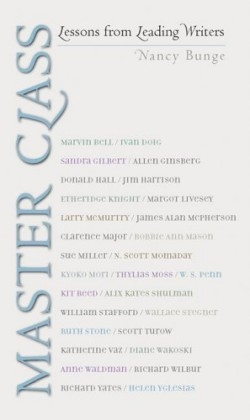
Master Class
Lessons from Leading Writers
It is a paradox well worth repeating that no single author is ever quite master of his or her literary material: words outwit and outgrow their writers’ best intentions. (That’s why poetry is not journalism.) This humbling wisdom is but one of the informed and encouraging bits of earnest self-evaluation gleaned from the twenty-nine novelists and poets herein, including a generous representation of National Book Award and Pulitzer Prize winner and finalists. A partial roll-call: Larry McMurtry, Ivan Doig, Donald Hall, Wallace Stegner, Sandra Gilbert, Richard Wilbur, Richard Yates, and Jim Harrison.
The book’s first half, called “Theory” in nod to the number of writers who teach creative writing, reprints the author’s 1985 book of interviews. Luckily for Bunge, her sources have aged rather well. The wide range of teaching methods, stretching from Allen Ginsberg’s intense bonding with students to Diane Wakoski’s tough love poetry-writing seminars, is itself a nostalgic time capsule of the freedom-loving 1970s.
In the second section, “Practice,” eight contemporary writers tell the story of their own beginnings, though none share any direct mentorship or influences from the first section of authors. This latter group includes Scott Turow (a lawyer who was scribbling fiction before office hours), Sue Miller (despite three Master’s degrees, she does not teach, and her domestic novels do not owe much to academics) and Bobby Ann Mason (who wrote a Ph.D. thesis on Nabokov before discovering her Kentucky roots as a novelist). These writers voice more ambivalence about the costive academic world of creative writing programs.
Indeed, there’s an interesting, almost subversive, dialogue between these two time-bound sections. In 1981, William Stafford, author of some sixty-five volumes of poetry and a beacon of teaching spirit, spoke of what might be now called the beginning golden age of MFA program popularity. He welcomes all students as lifetime lovers of poetry: “the product is expendable, the process is precious.”
In 1995, however, Marvin Bell, then retiring from the University of Iowa’s Writers’ Workshop where his students notably included Jorie Graham, Rita Dove, John Irving, and James Tate, recalls how once fledgling poets argued passionately in the late hours of a bar, reprobates from the tweedy world of academia. Now he sees a too-careful calibration of writing risks, where MFA programs are but the first rung on the commercial networking ladder, how they are solely “cleaning the poem up to its most publishable form.” His one lesson in keeping the excitement of writing paramount: learn the rules, break the rules, learn the new rules, break the new rules.
Bunge, a professor in the Department of Writing, Rhetoric, and American Cultures at Michigan State University, and a Fullbright lecturer at the University of Vienna, has brought together a briskly told set of home truths about writing.
Reviewed by
Leeta Taylor
Disclosure: This article is not an endorsement, but a review. The publisher of this book provided free copies of the book to have their book reviewed by a professional reviewer. No fee was paid by the publisher for this review. Foreword Reviews only recommends books that we love. Foreword Magazine, Inc. is disclosing this in accordance with the Federal Trade Commission’s 16 CFR, Part 255.
